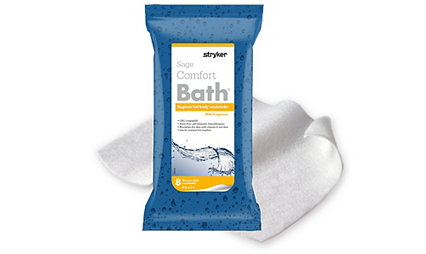How to give a bed bath: A step-by-step guide*
13-Jan-2025

Providing a safe and comfortable experience for your loved one
National Bath Safety month, observed every January, underscores the importance of compassion and hygiene in caregiving routines. Knowing how to give a bed bath is an essential skill for both nurses and home caregivers. It’s important to maintain hygiene, prevent skin issues, and enhance the dignity and comfort of individuals who can’t bathe themselves. Below is a comprehensive guide to help you deliver a bed bath with care and respect.
Why bed baths matter
Bed baths go beyond just keeping a person clean. They may play a vital role in:
- Maintaining skin health: Prevents rashes, sores, and infections.
- Promoting comfort: Helps patients feel refreshed and dignified.
- Facilitating monitoring: Provides an opportunity to check for skin redness, sores, or other concerns.
Preparing for a bed bath
Before beginning, gather all necessary materials and ensure the room is prepared for the patient’s comfort.
What you’ll need:
- Several soft washcloths
- Towels (to dry the patient and protect the bed)
- Two basins (one for soapy water, one for rinsing)
- Baby soap or a gentle cleanser
- No-rinse or baby shampoo
- Lotion (unscented and for dry skin)
- Waterproof covering or mat for the bed
- A lightweight blanket for modesty and warmth
For added convenience, you can also use prepackaged bathing cloths. These cloths eliminate the need for water and soap while saving time. They also reduce the risk of spills and help maintain hygiene, making them a good option for busy caregivers.
Room setup:
- Adjust the room temperature to ensure it’s warm and comfortable.
- Fill the basins with warm water, ensuring it’s not hotter than 115°F (46°C). If a thermometer isn’t available, test the water with your elbow—it should feel warm but not hot.
- Place a waterproof covering on the bed to keep it dry.
- Ensure privacy by closing doors, blinds, or curtains.
Step-by-step bed bathing instructions
Follow these complete bed bath steps to give a thorough, respectful bed bath:
Hand hygiene and gloves
Wash your hands thoroughly before starting. Wear gloves if needed, especially if there is a risk of contact with bodily fluids.
Maintain dignity
Cover the patient with a lightweight blanket or towel, exposing only the area being washed. Allow the patient to wash themselves as much as they are able.
Start with the cleanest areas
Wet a washcloth with plain warm water (no soap yet) and gently wipe one eyelid, moving from the inner corner to the outer corner. Use a clean section of the cloth for the other eye. Use a soapy washcloth to clean the face, neck, and ears. Rinse and pat dry.
Wash the body in sections
Begin with the upper body, washing one side at a time. After washing each section, rinse with a clean washcloth and pat dry. Replace the blanket or towel to maintain warmth and privacy. Follow this order:
1. Arms and hands
2. Chest and belly (including skin folds)
3. Hips and legs
4. Feet and toes
Wash and rinse the feet, paying attention to the spaces between the toes.
5. Back and genital area
Help the patient roll onto their side (ask for assistance if needed). Wash the back and buttocks, checking for sores or redness.
Change the water and use a clean washcloth to wash the genital area:
For women, always wipe front to back to prevent infections
For men, clean under the testicles and around the groin area
6. Hair Washing (Optional)
If needed, wash the hair using no-rinse or gentle shampoo. Use a basin to rinse thoroughly. An all-in-one shampoo cap is another way to easily clean and condition hair without running water.
Post-bath care
After completing the bath:
Apply an unscented body lotion to dry areas, avoiding places prone to moisture (like under the breasts or in the groin).
Help the patient dress in clean clothing and ensure their bedding is dry and comfortable.
Dispose of dirty water and clean supplies.
Pro tips for success
Check skin closely: Bed baths are an ideal time for monitoring the patient’s skin health. Look for signs of pressure sores, redness, or dryness.
Communicate: Explain each step to the patient to keep them comfortable and involved.
Be gentle: Use soft, non-abrasive washcloths and avoid scrubbing sensitive areas.
Giving a bed bath is more than a routine task—it’s an act of care and compassion. By following these steps, you can ensure your patient or loved one feels clean, comfortable, and respected. Regular, thorough bed baths are vital to maintaining their physical and emotional well-being.
If you’re a caregiver, remember that your efforts make a significant difference in the lives of those you care for. If you’re interested in learning more about prepackaged bathing products or purchasing them directly, visit our prepackaged bathing portfolio.
Read more
A history of making healthcare better – at home
For over a decade, Stryker Home Care has been helping home caregivers and those navigating life with physical challenges get hospital-quality products with just a click online.
Learn moreSage Rinse-Free Shampoo Cap
The Sage rinse-free shampoo cap makes it easy to clean and condition hair for patients with limited mobility. It’s entirely self-contained and eliminates mess, cleanup time, and the need to change wet bed linens, providing the ultimate convenience.
Learn more*These are general recommendations. Always follow all product instructions.
SAGE-PH-COMM-1445121_REV-0_en_us



